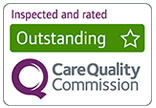How does this work?
- We hold quarterly caseload reviews of all our teenagers and young adults and identify those with ongoing palliative care needs.
- If they are over the age of 18, we then speak with the young adults and their families to see if they would like to be referred to their local adult hospice, and if so, make the necessary referrals to start the process.
- We offer to come with you for your initial meeting and help build that all important trust and confidence in the new service.
- After the initial meeting, there are various things that could happen next. These could include:
- A Multidisciplinary meeting to bring key professionals together, to make sure everyone is informed and working towards the same goals. This can identify any gaps in current provision, and look to close these gaps. An Introduction to key professionals with adult acute settings (Acute liaison nurses and LD community team if you had a diagnosed learning disability or your local district nursing team.
-
- The opportunity to have Advanced care planning discussions, to support effective parallel planning (best and worst case scenarios). This is completely optional, and is not about limiting treatment. It is more to ensure we get the wishes of the young person and their family, down on paper and to ensure their voice is heard if they become unwell.
- The opportunity to get helpful paperwork completed. Very often those with complex health needs have the opportunity to create hospital passports and get the names flagged on adult database systems to highlight the need for additional support (longer visiting hours, side rooms where appropriate and most importantly the role of parent as advocate), these forms can be invaluable when there is an unplanned admission to hospital.
- The offer of a referral to an adult hospice is your choice and when you are ready. Every adult hospice works in a slightly different way, but they are all keen to support our young adults, and we aim to support them in getting to know you and help you feel comfortable with them.
- You may have very little, or lots of involvement with your adult hospice, but they are there to support you as you much as you need. We will continue to support you alongside our adult colleagues, until you feel ready to transition fully, or you reach the age of 23. Your Claire House offer does not change by agreeing to a referral to an adult hospice. You instead get the best of both worlds.


 Claire House is primarily a children’s palliative care service and as part of the transition service, we offer an introduction to adult palliative services. The transition team has improved the collaboration between children’s and adult palliative care services through joint working on some individual cases, and increased partnership working and relationship building. The transition team understand there are differences between each service and their respective offers, but we feel there is a lot of value to be gained from being referred to adult palliative care.
Claire House is primarily a children’s palliative care service and as part of the transition service, we offer an introduction to adult palliative services. The transition team has improved the collaboration between children’s and adult palliative care services through joint working on some individual cases, and increased partnership working and relationship building. The transition team understand there are differences between each service and their respective offers, but we feel there is a lot of value to be gained from being referred to adult palliative care.